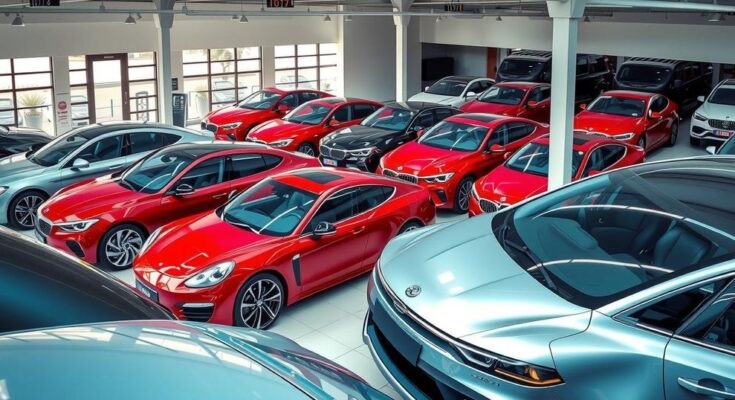Chinese carmakers have rapidly expanded in Indonesia, offering affordable electric vehicles that challenge the dominance of Japanese and South Korean brands. Despite an overall decline in car sales, favorable tax breaks and government incentives attract these automakers. Major players have entered the market, and the landscape of local automotive sales is evolving in response to these changes. However, challenges such as dealership concentration and consumer perceptions remain.
Chinese automotive brands have rapidly expanded into the Indonesian market over the past three years, providing budget-friendly electric vehicles (EVs) that are rich in features. This strategic entry has begun to undermine the dominance previously held by Japanese and South Korean manufacturers. Despite a decline in new car sales in Indonesia, Chinese automakers are attracted to this market due to increased competition at home and favorable tax incentives for imported vehicles.
In its 2023 annual report, SAIC Motor emphasized the escalation of market rivalry resulting in unprecedented price wars, particularly among EVs, where average prices saw a 10% reduction in December alone to enhance sales figures. This aggressive pricing strategy led to SAIC Motor losing its status as the largest automotive seller in Indonesia to BYD last year, as the company navigates challenges including excess production capabilities. Goldman Sachs indicates that Chinese EV manufacturers possess an annual production capacity of approximately 20 million vehicles, but only 11 million were sold domestically last year.
China’s automotive exports surged threefold to about six million units between 2021 and 2024, positioning the nation as the world’s leading car exporter. During this time, automotive exports to Indonesia doubled in value to reach $3.2 billion. Following earlier introductions of brands like Wuling and DFSK, several new Chinese automakers, including Great Wall Motors, Neta, and BAIC, have made their entry into Indonesia, with some establishing local manufacturing sites.
Fitch Solutions analyst Koketso Tsoai remarked on the appeal of Chinese automakers in Indonesia, underscoring the provision of high-tech, competitively priced vehicles that are resonating well with local consumers. Government incentives, such as tax discounts for EVs, bolster Indonesia’s attractiveness to these brands. Redseer Southeast Asia partner Roshan Raj identified the necessity for Chinese companies to diversify from oversaturated local markets and the favorable government regulations as key drivers of their entry.
Nevertheless, the anticipated boost to new car sales may be limited, especially in light of a notable decline in overall sales, dropping by 13.9% year-on-year to 865,000 units. Although demand for Chinese EVs has increased, overall economic pressures continue to hinder market growth. Data reveals that Chinese automakers’ market presence in Indonesia grew from 3.4% in 2021 to 6.4% the following year, while Japanese brands saw their market share decline from 95% to 89.3% during the same period.
Amidst these developments, concerns have arisen regarding the impact of rising EV imports on local competitors. House of Representatives Commission VII deputy chairman Lamhot Sinaga voiced apprehensions about how the influx of Chinese imports has undermined the competitiveness of Hyundai’s local operations, which have reportedly experienced a 30% reduction in production since 2022. The Industry Minister also urged foreign carmakers to invest in local production rather than simply rely on imports.
Analyst Yannes Martinus Pasaribu indicated that while Chinese manufacturers aim to develop local supply chains and establish production facilities in Indonesia, challenges remain, particularly regarding dealership distribution and after-sales services, which are predominantly located in Java. Additionally, consumer sentiment towards Chinese brands is still evolving.
Chinese electric vehicle manufacturers are strategically penetrating the Indonesian automotive market, challenging long-standing dominance by Japanese and South Korean brands. Motivated by competitive pricing, government incentives, and increasing local demand, they are expanding their presence despite overall declines in car sales. Challenges remain, including the need for localized manufacturing and the mixed perceptions of Chinese vehicles among consumers. Yet, the landscape suggests a significant shift may occur in the coming years as the market continues to adapt.
Original Source: www.thestar.com.my




